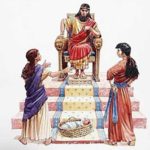Not long ago, while counseling a client, I came to a conclusion I had not thought about before. The client was struggling with “trying” to follow the process I counseled, but kept failing. The client was struggling with the desire to view pornography and the desire to be a “good” Christian, at the same time. He and I began the counseling months ago with exploring various possibilities of why he got started and why he continues. Each aspect we discovered and dealt with helped him to understand another part of his character, and cause him to become more determined to change. Though he would have success, he would also fail again. We were almost to the point of running out of probable answers, when I received an inspiration from the Lord.
Before I explain, let me make one point clear, there are no “good” or “bad” Christians. There are just Christians who are in the process of change and growth. They are not responsible for changing themselves, that is the Lord’s work (Hebrews 12:2 (AMP), ”… Jesus, Who is the Leader and the Source of our faith [giving the first incentive for our belief] and is also its Finisher [bringing it to maturity and perfection].”) Our job, as it were, is only to obey Him. As we obey, we change. Little obedience, little change. Big obedience, big change.
Now back to my earlier point. I received an inspiration from the Lord regarding what was happening to the client. I could tell he was serious in his efforts to curb the watching of pornography, but I could also tell he could not understand why he still chose to do it.
 “When Jesus died on the cross,” I explained to him, “one of the things He accomplished was giving us liberty. That means complete freedom to do as we choose, right or wrong.”
“When Jesus died on the cross,” I explained to him, “one of the things He accomplished was giving us liberty. That means complete freedom to do as we choose, right or wrong.”
Galatians 5:1 (NASB), “It was for freedom that Christ set us free; therefore keep standing firm and do not be subject again to a yoke of slavery.” We used to be under the power of Sin, and therefore we would not do what is right, because it had a hold on us and moved us to do so. The death of our Lord on the cross set us free from the bondage of Sin, and we do not have to continue doing what is not right. On top of that, as you can see from the Galatians verse, we are told not to “be subject” (which means to not put ourselves under the control) of Sin again. This clearly means that we have a choice to stay free or go back to slavery under Sin. At the same time it also shows that we have been given freedom to choose. This means the freedom to choose to disobey God as well. Freedom is not freedom, until it is freedom (the complete liberty to make our own choices). If God is controlling our choice about something, then we do not have the freedom to choose.
When God said, “Let Us make man in Our image, according to Our likeness; and let them rule over the fish of the sea and over the birds of the sky and over the cattle and over all the earth, and over every creeping thing that creeps on the earth,” in Genesis 1:26 (NASB), I believe that the “likeness,” referred to there, includes the ability to (as God can) freely choose to obey or not to obey. The only way we truly seem “god-like” (as in “Our image”) is that we can actually choose to disobey the creator and Lord of this universe. When the Christ died on the cross, He did not take away our freedom to disobey, He freed us from the power of Sin, which used this ability against us to get us to choose not to do what is right. But, I contend, that the Messiah maintained that freedom when He freed us from Sin, as pointed out in the Galatians verse above. Notice also the following argument made in Galatians 5:13 (NASB).
“For you were called to freedom, brethren; only do not turn your freedom into an opportunity for the flesh, but through love serve one another.” Notice the wording here, “do not,” as in, “You have the power to do or not do.” The Lord would not tell us (through Paul) that we could keep our freedom from turning into “an opportunity for the flesh,” if we could not make the decision (have the freedom) to do so. God has given us a gift that is beyond my words to express the greatness and unfathomable measurement of it. In essence, and to a point, it gives us the ability to go beyond the control of God, as no other creation of His can. Though He is God, Creator and Lord, over all of the creation, He has chosen to limit Himself to this certain aspect of the human condition; we have self-will (complete freedom to choose not to do what is right), and the Lord did not take that away on the cross.
In fact, 1 Peter 2:16 (NASB) shows as much. In that verse, “Act as free men, and do not use your freedom as a covering for evil, but use it as bondslaves of God,” we are told to “use” our freedom. Only free people can “use” their freedom, and, if they are not able to choose the manner in which they use this freedom, they are not truly free. When Jesus set us free through His death on the cross, it was for true freedom; the liberty to live and choose as we want. Right or wrong, we are to make that choice.
I explained to my client that this was part of the problem he was struggling with. He was expressing his freedom, even from God Himself. He may have accepted Christ as his Savior, but he had never accepted Him as his Lord. The Apostle Paul understood this clearly. In 1 Corinthians 10:23 (AMP), “All things are legitimate [permissible—and we are free to do anything we please], but not all things are helpful (expedient, profitable, and wholesome). All things are legitimate, but not all things are constructive [to character] and edifying [to spiritual life]. Notice the words carefully, “We are free to do anything we please.” Yes, that’s right, anything, but not all things are good for us.
The problem my client was having, was that he still had “rights.” He still saw himself as this free Christian who could do as he pleased. And, isn’t that what the Christ wanted for him anyway, freedom? Of course He did, but not to do what is not the right thing. Remember, as it says in James 4:17 (NASB), “Therefore, to one who knows the right thing to do and does not do it, to him it is sin.” The word “sin” here means to fail to do the right thing. See the words? “Knows,” and “does not do.” These are clear indicators that the person is in full control of their decision. They have freedom; the liberty to do what is not right.
So what’s the answer? The simple answer is accept Him as your Lord. Reread 1 Peter 2:16 again, and you will run into the phrase “bondslave.” What is a “bond-slave?” Well in Peter’s time, when people owed more money than they were able to pay off, they would either be taken into slavery, or volunteer to become slaves, until the debt was paid off. Some people owed so much that they would often be someone’s servant for many years. Every once in a while, some of the slaves would serve enough time to be set free, and the debtor (master) would inform them and tell them they could leave. In some cases, the freed people would consider their circumstances. While they were slaves, the owner provided all their food, their clothing, a place to live, in some cases even took care of the wives and children, paid all the bills, and so on. If they left, freely, they would have to get jobs, find a place to live, pay rent or mortgage, buy their own food and clothing, basically meet all their own needs. In many cases, they chose instead to remain slaves to the master. They rationalized that being his slave was better than being free.
This is what the Apostles Paul, Peter, and the rest came to understand. That being free was not what is was cut out to be. Freedom meant that you would probably choose not to do what is right. They may not have done this specifically, but I believe they weighed the differences in their hearts, if not in their minds. I can use this freedom which the Christ has given me, and I can make all my own choices, decisions, live as I believe is the right way to live, and obey the instructions I believe are right. I may “sin” once in a while, but I have already been forgiven of all my sins anyway. Or…
I can give up my freedom. I can acknowledge Christ Jesus as my Lord, and willingly become His “slave.” In which case, He will decide what I want, and when I will want it, what I am to choose, how I am to feel, what I am to believe, and who I am to be. I will become His servant in ministering to other people. I will become His eyes, His mouth, His hands, His feet, and His heart, when it comes to fulfilling His plans. I believe that the Apostles chose a life of “slavery” (bond-slaves) rather than to live a life of freedom, because this was what God wanted from them.
I told my client, God wants you to accept Him as your Lord. He wants you to willingly choose to become His “slave.” He wants you to give Him control over your life so that He can keep on with the work of changing you. My client asked, “Will that mean I won’t sin anymore?” “No,” I said, “Humans “sin,” as you say, just because we are human. Humans will always struggle with failure and error. This is “sin” too, just not the kind you are thinking about.” James 4:17 says that “sin” is when someone knows the “right thing to do and does not do it.” This means that even when we are trying to do the right thing, and get it wrong, or do not do it perfectly, we have sinned (we failed or erred). On the other hand, there is the other kind of “sin.” This is where we willingly choose to do the wrong things. To get to this point, the person must first not do the “right thing.” The “right thing” in this case is to obey God. If we choose to disobey God, we then will be able to choose to do all the wrong we want. If we choose to obey God (be His slaves and let Him do the choosing) then we take away our ability to do what is wrong. The two concepts cannot continue at the same time, in the same person. If we choose one, then, and therefore, we choose against the other. We will either live as though we have rights, or live as though we are servants of God.
“So,” he said to me, “If I make God my Lord, and place myself under His control, then I won’t do wrong against Him?” “Yes,” I said to him, “If you give up your freedom to Him, allow Him to make your decisions for you, and if you obey His instructions, you will never do wrong against God.”
All Christians have accepted Christ Jesus as their Savior, but too many have yet to accept Him as their Lord. How about you? Have you?






